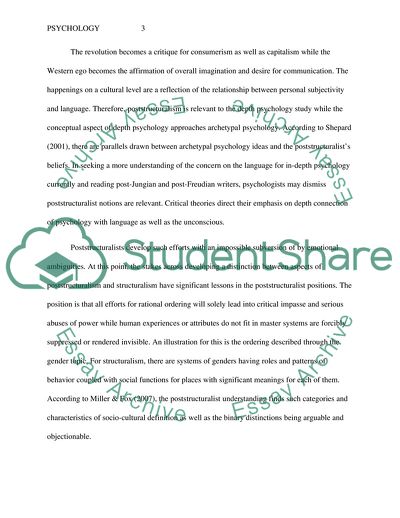Cite this document
(Why Should Psychologists Be Interested in Poststructuralism and Postmodernism Literature review Example | Topics and Well Written Essays - 3000 words, n.d.)
Why Should Psychologists Be Interested in Poststructuralism and Postmodernism Literature review Example | Topics and Well Written Essays - 3000 words. https://studentshare.org/psychology/1817403-why-should-psychologist-be-interested-in-poststructuralism-andor-postmodernism-what-are-the-strength-and-limitations-of-these-critical-frameworks
Why Should Psychologists Be Interested in Poststructuralism and Postmodernism Literature review Example | Topics and Well Written Essays - 3000 words. https://studentshare.org/psychology/1817403-why-should-psychologist-be-interested-in-poststructuralism-andor-postmodernism-what-are-the-strength-and-limitations-of-these-critical-frameworks
(Why Should Psychologists Be Interested in Poststructuralism and Postmodernism Literature Review Example | Topics and Well Written Essays - 3000 Words)
Why Should Psychologists Be Interested in Poststructuralism and Postmodernism Literature Review Example | Topics and Well Written Essays - 3000 Words. https://studentshare.org/psychology/1817403-why-should-psychologist-be-interested-in-poststructuralism-andor-postmodernism-what-are-the-strength-and-limitations-of-these-critical-frameworks.
Why Should Psychologists Be Interested in Poststructuralism and Postmodernism Literature Review Example | Topics and Well Written Essays - 3000 Words. https://studentshare.org/psychology/1817403-why-should-psychologist-be-interested-in-poststructuralism-andor-postmodernism-what-are-the-strength-and-limitations-of-these-critical-frameworks.
“Why Should Psychologists Be Interested in Poststructuralism and Postmodernism Literature Review Example | Topics and Well Written Essays - 3000 Words”. https://studentshare.org/psychology/1817403-why-should-psychologist-be-interested-in-poststructuralism-andor-postmodernism-what-are-the-strength-and-limitations-of-these-critical-frameworks.


